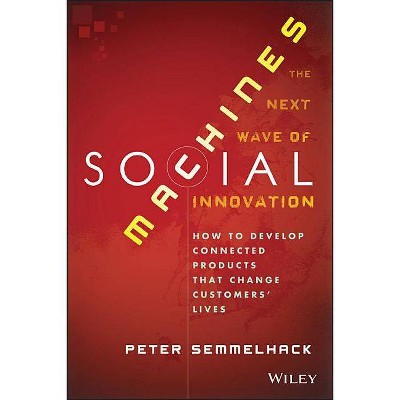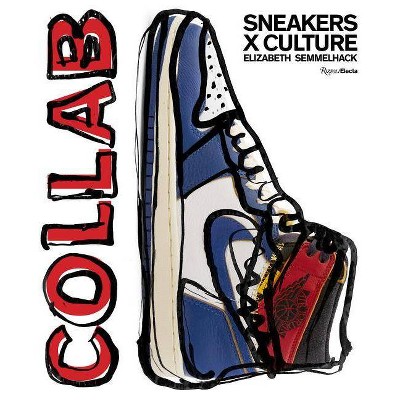Social Machines - by Peter Semmelhack (Hardcover)

Similar Products
Products of same category from the store
AllProduct info
<p/><br></br><p><b> Book Synopsis </b></p></br></br><p>Companies like Facebook and Twitter have redefined social interaction. But what if "machines" like automobiles, bicycles, health monitors, appliances, instruments, and anything else you can connect to the Internet, could all become members of your social network, collect data you care about, and feed it back to you at just the right time? Nike+ is already doing this for your body, but every major industry, from healthcare to cars to home construction, is now building sensors and digital connectivity into their next generation of products. Companies like Ford, Pepsi, Verizon, and Procter and Gamble are also using "social machines" to reach new markets, improve brand/market awareness, and increase revenues. <i>Social Machines</i> is the first book for business people, marketers, product developers, and technologists, explaining how this trend will change our world, how your business will benefit, and how to create connected products that customers love.</p> <ul> <li>Explains how smart phones and tablets enable Social Machines</li> <li>Describes how digital technology is being "baked in" to the most unlikely new products--even wheelchairs.</li> <li>Articulates how the "Internet of Things" is becoming social--and why that's the foundation for powerful new business models</li> </ul> <p>In the very near future, every great new product will be social. The next stage of interaction between people and our environment is upon us.</p><p/><br></br><p><b> From the Back Cover </b></p></br></br><p><b>50 billion products will be sharing information over the Internet by 2020--will yours?</b></p> <p>Our online interactions form the backbone of companies like Facebook and Twitter and have redefined how we communicate. But what if machines like vehicles, health monitors, and appliances could all become members of your social network and share important information with you about what's happening in your automobile, your home, and your body? Well, the future is already here.</p> <p>Social machines use everything from tiny, low-cost sensors to powerful embedded computers to securely gather valuable data from a growing collection of connected devices--cars, fitness trackers, irrigation systems, power meters, hospital beds, and many more. These machines communicate this data over the Internet to social networks of people and machines who can respond to a problem, deliver a service, or sell a solution. Nike, Ford, Procter & Gamble, and others are already using this technology to develop the next generation of Internet-enabled products and services that will drive the next wave of worldwide product innovation. Consider what's already out there: </p> <ul> <li>Nike's Nike+ shoe sensors can communicate with a smartphone app, which becomes your fitness guru, motivator, and record keeper</li> <li>P&G and Walmart collaborated on a social vending machine that instantly distributes free samples of Cascade dish soap when customers use their smartphones to like the Cascade page on Facebook</li> <li>A Dutch start-up uses wireless sensors on cattle that send a message to farmers when an animal is sick or pregnant</li> <li>A wireless heart monitor from Corventis can text a physician when a patient's heart palpitates</li> </ul> <p>Social machines are the next big thing. Experts predict that an estimated 50 billion products will be sharing data over the Internet by 2020. <i>Social Machines</i> is the first book to explain the benefits and the process of connecting machines to a social network and bringing these products to a mass market. It shares step-by-step guidance on how to learn from existing implementations and customize them for your own use.</p> <p>Who says only humans can be social? Social creates a compelling new business model for the Internet of Things. With cutting-edge advice from the forefront of the field, <i>Social Machines</i> will help you leverage this power to enormous advantage for your organization.</p><p/><br></br><p><b> About the Author </b></p></br></br><p><b>PETER SEMMELHACK</b> is the founder and CEO of Bug Labs, developer of an award-winning open source consumer electronics and web services platform, recently featured in MoMA's "Talk to Me" exhibit. As a founding member of the rapidly growing open hardware movement, Peter is a frequent speaker at events around the world. He is also founder, board member, and former CEO of Antenna Software, one of the country's largest mobile enterprise software companies. His work has been covered and discussed by the international media including the<i> New York Times</i>, the<i> Economist</i>, the<i> Hindu</i>, <i>Fortune</i>, CNN, <i>Nikkei Business</i>, and <i>Forbes</i>. Peter holds a BA in economics from Brown University.
Price History
Price Archive shows prices from various stores, lets you see history and find the cheapest. There is no actual sale on the website. For all support, inquiry and suggestion messages communication@pricearchive.us




















